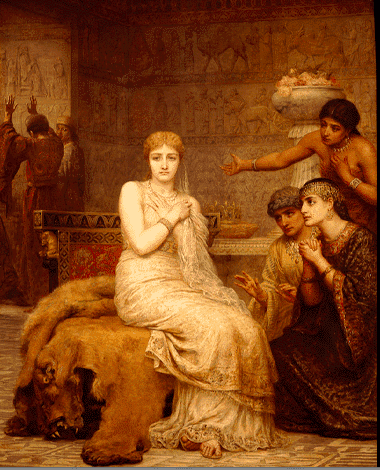Vashti: Honoring Herself
By Carrie Badertscher
Read Esther 1
One hundred and twenty-seven provinces. One hundred and eighty days of feasting and drinking. Seven more days of drinking. The scene is set.

Three years into ruling Persia, King Xerxes—an egocentric king, enthralled with power, position, and possessions—invites dignitaries from far and wide to come and feast and drink in his palace. For 180 days, gold goblets overflow with choice wine, and pomp and splendor are on full display.
At the completion of the initial 180 days, an additional invitation is extended to all men in Susa, from the greatest to the least, for another seven days of drinking and feasting in the courtyard. During this time, nothing is held back. The king’s generosity is demonstrated through a lack of restriction as he instructs his royal officials to serve each man as much as he wants. Drunkenness abounds.
After seven days of overconsumption, King Xerxes, in a drunken stupor, instructs seven eunuchs to retrieve his wife, Queen Vashti, and bring her to the banquet, adorned in her royal crown. He has shown his power, his palace, his prominence. He would now show off his prized possession, his wife, for he desires all to gaze upon her beauty.
Queen Vashti refuses to come.
King Xerxes burns with anger.
Perhaps in complete embarrassment by Queen Vashti’s deliberate “disobedience,” King Xerxes quickly consults with his advisors to see what could be done with Vashti in accordance with Persian custom and laws. Hurried conversation, hushed tones. If word spreads of Vashti’s defiance, women all over the province would take Vashti’s lead and also defy their husbands. Something must be done, and it must be done quickly.
Queen Vashti’s disobedience is met with two things: a dismissal and a decree.
Vashti is banished from the presence of the king. She is stripped of her position and her palace. Along with her banishment comes a written decree from Xerxes himself to every husband in the vast empire: “that every man should be the ruler of his own home and should say whatever he pleases” (Esther 1:22).
King Xerxes would now hold a beauty pageant to choose his next possession, his next queen, who we will later learn is Esther.
When we read the book of Esther, we all too often minimize the profound story of Vashti. Perhaps we downplay her story because the number of verses that detail her narrative pale in comparison to the many verses we have regarding Esther. Or maybe, just maybe, Vashti’s strong resolve and defiance doesn’t match what we think a biblical heroine should look like.
To be clear: Vashti is not Esther’s foil. She is not the villain queen whose disobedience simply makes way for a true heroine queen. Yes, we see throughout the book of Esther that Esther learns to play King Xerxes’ game, and God works in supernatural ways. But there is also a fiercely faithful woman who comes before Esther who refuses to play the king’s game, and her courage must also be recognized. Her name is Vashti, and she knows that she’s nobody’s show pony.
When Vashti resolutely makes the decision to defy the king, she chooses dignity over her place in society. She courageously sacrifices a kingdom rather than cater to the vanity of another. Vashti refuses to disregard her conscience and instead accepts unmerited disgrace and dismissal. She knows what she can control: her response to the king. And she knows what she cannot control: the consequences of that response. Still, the cost for her is worth it, for she remains unmoved when she is demanded to show up and show out. The implications of Vashti’s bravery ripple throughout the province and cause those in power to fear. What would happen if other women realize that they need not perform? If Vashti can stand up to the king and refuse to be seen as a possession, perhaps others, too, would draw from her strength and do the same. (Lord, let it be so.)
Vashti presents to us a model of ethics, one that is not gendered. Just as we see Joseph say no to Potiphar’s wife in Genesis 39 when Potiphar’s wife tries to convince Joseph to sleep with her, we also see Vashti refuse to cross an ethical line. This denial as a matter of conscience costs her almost everything—but not everything. You can be sure she kept all that was important, all that was long lasting. Her dignity, her value, and her integrity all stayed intact. These things are not something that King Xerxes can take away because these things are given to her by a fiercely faithful and loving God when God makes her in God’s very good image, long before she is chosen to be King Xerxes’s queen.
If it hasn’t already happened in your life, there will more than likely be a time that comes when someone demands that you show up and perform. You may be invited or feel required to adorn yourself, disregard your moral conscience, and join the party. You may even be tempted to play the game voluntarily in order to feel accepted or validated. Or maybe you’ll find yourself inclined to play along because you’re afraid of what you might lose.
If and when you are faced with this pressure and decision, may you remember that you have a God who has an all-consuming love for you. And may that love give you divine courage to refuse to bend for the approval of another, regardless of the cost.
I can’t help but think that Queen Vashti’s courage may have played a role in Esther’s resolve to stand up to their shared king. When we reflect God’s fierce faithfulness with our lives, it tends to also affect those around us. Our secure belonging in God’s faithfulness gives us bravery to do the right, hard thing. And that bravery has the power to reach far beyond our temporal lives. Just as it is with Vashti, so let it be with us.
God’s beloved:
May you find your worth, value, and dignity in a God who is not mesmerized by fame or power.
May you understand that God’s acceptance and love are not dependent on your adornment or ability to perform.
And may we, as a community, recognize the Vashti in ourselves and in our neighbor, which is a true reflection of a fiercely faithful God.













